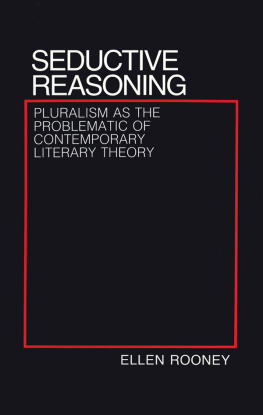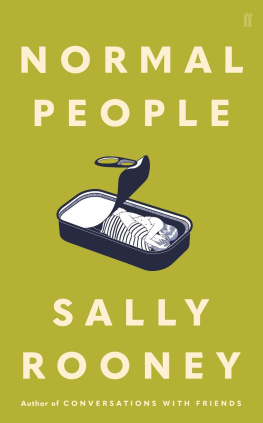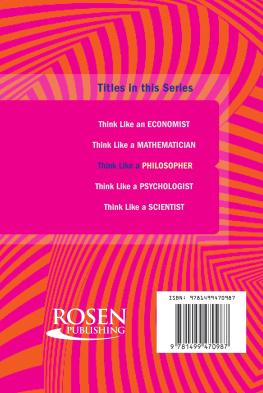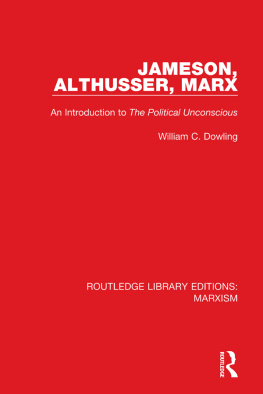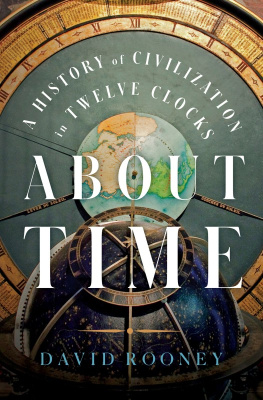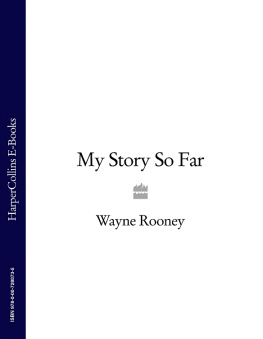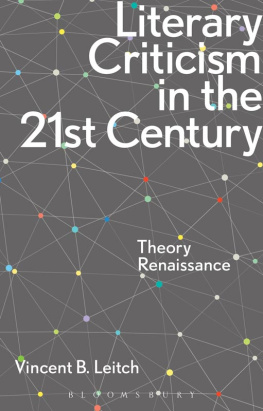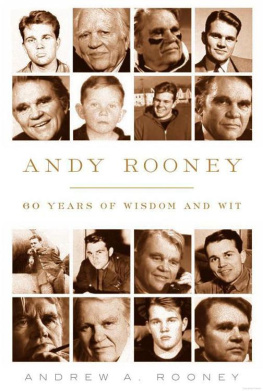ABBREVIATIONS OF FREQUENTLY CITED TEXTS
| AR | Paul de Man. Allegories of Reading. New Haven: Yale University Press, 1979. |
| B | Wayne Booth. Preserving the Exemplar: or, How Not to Dig Our Own Graves. Critical Inquiry 3:3 (1977), 40723. |
| BI | Paul de Man. Blindness and Insight. 2d ed., revised. Minneapolis: University of Minnesota Press, 1983. |
| CU | Wayne Booth. Critical Understanding. Chicago: University of Chicago Press, 1979. |
| F | Stanley Fish. Is There a Text in This Class? Cambridge: Harvard University Press, 1980. |
| FM | Louis Althusser. For Marx. London: New Left Books, 1977. |
| G | Suzanne Gearhart. Philosophy before Literature: Deconstruction, Historicity, and the Work of Paul de Man. Diacritics 13:4 (1983), 6381. |
| H | E. D. Hirsch, Jr. The Aims of Interpretation. Chicago: University of Chicago Press, 1976. |
| K | James Kavanagh. To the Same Defect: Toward a Critique of the Ideology of the Aesthetic. In Literature and Ideology , ed. Harry R. Garvin. East Brunswick, N.J.: Associated University Presses, 1982. |
| KM | Steven Knapp and Walter Benn Michaels. Against Theory. Critical Inquiry 8:4 (1982), 72342. |
| LP | Louis Althusser. Lenin and Philosophy. London: Monthly Review Press, 1971. |
| M | Pierre Macherey. A Theory of Literary Production. London: Routledge & Kegan Paul, 1978. |
| NA | Garry Wills. Nixon Agonistes. New York: Signet, 1971. |
| OD | Jonathan Culler. On Deconstruction. Ithaca: Cornell University Press, 1982. |
| PR | M. H. Abrams. How to Do Things with Texts. Partisan Review 46:4 (1979), 56688. |
| PU | Fredric Jameson. The Political Unconscious. Ithaca: Cornell University Press, 1981. |
| R | Paul de Man. The Resistance to Theory. Yale French Studies 63 (1982), 320. |
| RC | Louis Althusser and Etienne Balibar. Reading Capital. London: New Left Books, 1979. |
| RW | Raymond Williams. Marxism, Structuralism and Literary Analysis. New Left Review 129 (September/October 1981). |
| S | Gayatri Spivak. In Other Words. New York: Methuen, 1987. |
| SC | Louis Althusser. Essays in Self-Criticism. London: New Left Books, 1976. |
ACKNOWLEDGMENTS
This book has been a long time in the making, and Iowe debts of every order to the many people who helped make it possible. To begin at the beginning, Wesleyan Universitys English Department and its Center for the Humanities provided me with an environment both tolerant and stimulating and introduced me to the pleasures of theory. Karen Boklund first showed me the possibilities of a marxist semiotics; James Kavanagh pointed me in the direction of Althusser; Hayden White gave me the benefit of his liberating irony and read my first effort to assess Marxs suspicions about the rhetoric of persuasion; I remain grateful to each of them. I have since been most fortunate in all my readers. I particularly thank Stanley Fish, who read the manuscript in its earliest form and projected a future for it, which is the first, best gift of any reader, and Neil Hertz, who gave me the benefit of his scrupulous critical attention, shared his questions, and, on a few points, extended me the benefit of his doubts as well. Lawrence Scanlon, Andrew Gelber, Amy Barrett, and Carl Freedman all read portions of the manuscript; their comments guided my revisions. The final form of this essay owes a great deal to Christina Crosby, Mary Ann Doane, Karen Newman, and Naomi Schor, the members of a feminist reading group that welcomed me when I arrived at Brown University; they have given me intellectual and personal support, both by the sympathetic rigor of their questions and by the example of their own work. I do not expect to find better comrades anywhere. Neil Lazarus is a constant source of energy, ideas and encouragement, and I am thankful to him for pointing out my many blind spots. I benefited from the intellectual generosity of the members of the Pembroke Seminar of 198687 , whose questions sent me back to revise again, and I am especially grateful to Elizabeth Weed, whose insights, objections, and friendship made this book easier to write. I am also indebted to the students at Brown University who attended my seminars in feminist theory and shared their insights, and whose exuberant and uncompromising struggles, both inside and outside class, are a vivid reminder that the university need never be an ivory tower. Ruth Santos, Virginia Polselli, Arnold Sanders, and Eliel Mamousette extended to me their patience and friendship and helped me to shape the material environment in which I worked. Paul Smith, Richard Ohmann, W. J. T. Mitchell, and James E. Ford provided forums for portions of this work and helpful comments along the way, as did the anonymous referee for Cornell University Press. A portion of Chapter appeared in the Dalhousie Review (Summer 1984 ), and I am grateful for permission to make use of this material. I owe a large debt to Bernhard Kendler; his care and patience as an editor were matched only by his persistent encouragement, which helped bring this book to press. Kay Scheuers meticulous editorial advice brought home to me once again the limits of every critic as a reader of her own text. My thanks to Carole Doberstein and Lisa Giancola for their many gifts. My familymy parents, Lucy Hayes (the godmother we all need), and my brothers, Michael, John, Peter, and Paulhave been waiting for these pages to appear between hard covers for a combined total of forty-two years. The force of their humor, support, and love dwarfs that or any figure, and I am as grateful to them as I am hesitant to mention the next book. Finally, I am grateful to Khachig Tllyan. He is a relentless inspiration and a tireless critic, and sometimes sings me that old tune about all work and no play. He has warned me away from unnecessary compromises and the temptation to please everyone, which is to say, he has reminded me of the seduction of pluralism, and he is one of the reasons writing is a seductive part of the life I live. It is a great pleasure to dedicate this book to him.
Ellen Rooney
Providence, Rhode Island
1READING PLURALISM SYMPTOMATICALLY
The age of pluralism is upon us. It does not matter any longer what you do, which is what pluralism is.
Arthur C. Danto, The End of Art
I
The colloquial meaning of the term pluralist shadows all our theories of pluralism. Paradoxically, those very critical discourses that set themselves the task of explicating the pluralist project in literary studies have most successfully eluded recognition of this fact. The resulting elision has the quality of an eloquent absence, a necessary silence, which enables pluralism to persist and develop even while thwarting efforts to break with its problematic. To attend to this silence is to begin to trace the limits of pluralism, to mark the colloquial as figuring that which literary critical pluralism cannot contain.
In the American idiom, pluralism is an ordinary word, a nontechnical term, an integral part of ordinary language and popular consciousness. Despite its current appeal to some literary theorists, it is most characteristic of the quotidian cultural and social discourses of the mass media. Americans commonly speak of ethnic and religious pluralism, pluralist economies, and the virtues of their own pluralistic society. In all these uses, pluralist is an honorific. The very notion of pluralistic society
I begin with the colloquial both in order to introduce the question of exclusion and to signal a certain historical conjuncture as the place of the analysis to follow. The exclusion of the colloquial from both celebratory elaborations and critical evaluations of pluralism is in fact only the first in a series of strategic exclusions or repressions: of the political, and of marxism in particular, of discontinuity, of resistance, of the possibility of exclusion itself, which together constitute the problematic of pluralist discourse in American literary studies. These elisions and the subsequent collapse of pluralisms theoretical project actually promote the pluralist agenda; these are essential oversights, the enabling conditions of pluralisms persistent ideological power. The practical and theoretical consequences of these silences, the determinate manner in which what is absent or not said structures what is or can be said, occupy a pivotal position in the argument that follows.

